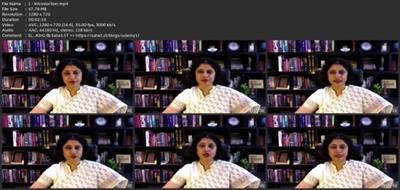
Electronic Evidence Under Indian Law
Posted on 08 Nov 11:34 | by mitsumi | 112 views

Electronic Evidence Under Indian Law
Published 11/2022
MP4 | Video: h264, 1280x720 | Audio: AAC, 44.1 KHz
Language: English | Size: 740.79 MB | Duration: 0h 32m
Admissibility of Electronic Evidence under Indian law
Published 11/2022
MP4 | Video: h264, 1280x720 | Audio: AAC, 44.1 KHz
Language: English | Size: 740.79 MB | Duration: 0h 32m
Admissibility of Electronic Evidence under Indian law
What you'll learn
Through this course you will understand what are electronic records and whether those are legally valid under Indian law?
You will understand what is electronic evidence and how it is defined under Indian law?
You will learn about the types of electronic evidence, that is primary and secondary
You will learn the basic principles of production and admissibility of electronic evidence before an Indian court of law.
You will understand requirement of filing a certificate under Section 65B of Indian Evidence Act, 1872 and contents required therein in order to produce electro
You will learn about the landmark judgements passed by Indian Courts on the admissibility of Electronic Evidence including emails, social media posts
You will be able to understand presumptions in law as regards electronic evidence
Requirements
Basic knowledge or interest in law
Description
This course begins with an introduction about the aspects of Electronic Evidence that are explained in the course. The course covers what electronic records are and whether these are legally recognized under Indian law. It explains what Electronic Evidence is and the types of Electronic Evidence, oral and documentary and primary and secondary. It explains the basic principles for its admissibility in Indian law and the landmark court decisions on the subject. It explains the Best Evidence rule for producing Electronic Evidence and provides examples and illustrations to explain Primary and Secondary Evidence. The course explains the requirements to be complied with for producing Electronic Evidence in a court of law. It explains key ingredients of Section 65B of Indian Evidence Act,1872. This course teaches how to draft a Section 65B certificate using a sample template and who is authorized to produce such a certificate. It explains the presumptions in law as regards Electronic Evidence and how these presumptions can be rebutted as regards its authenticity and integrity of an electronic evidence. It explains through examples how a forensic report documents hash value in a mirror image process to create a replica copy from an original device. The role of Examiner of Electronic Records notified under Section 79A of the Information Technology Act,2000 is explained as regards determining the authenticity of an electronic evidence. The course has various downloadable templates and additional resources, and e-books and additional reading materials for easy reference. It includes a preliminary and final MCQ assessment.
Overview
Section 1: Introduction
Lecture 1 Introduction
Lecture 2 What are Electronic Records and legal validity
Lecture 3 Definition of Electronic Evidence
Lecture 4 Types of Electronic Evidence
Section 2: Admissibility of Electronic Evidence
Lecture 5 Producing Electronic Evidence before an Indian Court
Lecture 6 Landmark cases decided by Indian courts on Electronic Evidence
Lecture 7 Presumptions in law as regards Electronic Evidence
Section 3: Explaining samples of Section 65B certificate and Forensic report
Lecture 8 How to draft a Section 65B certificate
Lecture 9 A sample forensic report
Lecture 10 Certificate requirement in UK and US
Lecture 11 Situation based Questions
Lecture 12 Summarising the learnings from the course
Law Students, legal professionals, teachers of law and Judicial and police officers, professionals dealing with cyber forensics and anyone who is interested to learn the basics of producing Electronic Evidence in an Indian court of law.

Download link
rapidgator.net:
uploadgig.com:
[/b]:
[b]1dl.net:
Related News
System Comment
Information
 Users of Visitor are not allowed to comment this publication.
Users of Visitor are not allowed to comment this publication.
Facebook Comment
Member Area
Top News



